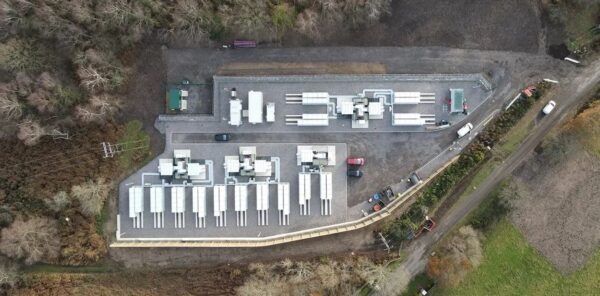Equinor energizes 25MW/50MWh Blandford Road battery storage project in UK
Equinor, a global energy leader, has marked a significant milestone in the renewable energy sector by inaugurating its first commercial battery storage asset, the Blandford Road battery storage project, in the UK. This strategic move underscores Equinor’s commitment to bolstering energy flexibility and security in the country, aligning with its broader ambition to transition towards more sustainable energy solutions.
Located in Dorset and connected to the Southern Electric Power Distribution (SEPD) network, the 25 MW/50 MWh Blandford Road battery storage asset is a testament to Equinor’s innovative approach to energy management. Developed and operated by Noriker Power, a British battery storage company in which Equinor holds a 45% equity share, this facility features approximately 150 lithium-ion battery units. It has the capacity to store sufficient electricity to power 75,000 UK homes for two hours, showcasing the potential of battery storage systems in enhancing the nation’s energy resilience.
Alex Grant, UK Country Manager at Equinor, highlighted the significance of this development, stating, “This is a significant milestone for our ambition to deliver flexible power and maintain security of supply in the UK. A strong battery storage portfolio will further strengthen our position as a leading broad energy partner to the UK, building on our 40-year presence which includes being a stable supplier of oil and gas, developing the UK’s offshore wind industry, and pioneering solutions to decarbonise the UK economy.”

Blandford Road battery storage project : Equinor Launches First Commercial Battery Storage Asset in UK, Advancing Renewable Energy Goals. Photo courtesy of Noriker Power Ltd.
The integration of battery storage systems into the energy mix is crucial for achieving the British Energy Security Strategy’s goal of 95% low-carbon electricity by 2030. These systems are pivotal in storing excess power from renewable sources like wind and solar, releasing it during peak demand periods to ensure a stable and secure energy supply while mitigating the impact of power price volatility.
Equinor’s vision for a renewable energy portfolio that marries generation assets with flexible solutions like battery storage is further exemplified by the development of its second battery storage project, Welkin Mill, in Greater Manchester. With a capacity of 35 MW/70 MWh, Welkin Mill will further enhance Equinor’s contribution to the UK’s energy transition, storing enough electricity to power over 100,000 homes for two hours and expected to be operational in 2024.
Olav Kolbeinstveit, senior vice president for onshore and markets within Renewables at Equinor, elaborated on the company’s integrated business model, which leverages Equinor’s industrial insights, Noriker’s local expertise, and Danske Commodities’ power trading experience. This synergistic approach aims to swiftly scale Equinor’s battery storage portfolio in the UK, optimizing value creation from power markets.
With a legacy of 40 years as a reliable energy partner to the UK, Equinor’s investments encompass a broad spectrum of the energy sector, from oil and gas to offshore wind, and now, battery storage. By 2030, Equinor aspires to invest over £10 billion in the UK, creating more than 5,000 jobs across various sectors, including offshore wind, CO2 capture and storage, hydrogen, battery storage, and traditional oil and gas, reinforcing its commitment to the UK’s energy future.
Equinor’s foray into commercial battery storage with the Blandford Road asset marks a pivotal moment in the energy sector’s evolution towards sustainability and resilience. This strategic move not only diversifies Equinor’s energy portfolio but also positions it as a key player in the renewable energy transition within the UK and globally.
Reinforcing Energy Security
The deployment of the Blandford Road battery storage project is a significant step toward enhancing the UK’s energy security. By providing a means to store and release electricity as needed, battery storage acts as a buffer against the variability of renewable energy sources. This is crucial for a country like the UK, which aims to derive a substantial portion of its electricity from renewable sources. Battery storage systems like Blandford Road ensure that the electricity generated from wind and solar power can be utilized effectively, even when production exceeds immediate demand or during periods of low generation.
Supporting the Low-Carbon Transition
Equinor’s investment in battery storage technology is timely and aligns with global efforts to combat climate change. The transition to a low-carbon economy requires not just an increase in renewable energy generation but also the development of infrastructure that can support the intermittent nature of these sources. Battery storage is indispensable in this regard, enabling the shift from fossil fuels to renewables by mitigating the challenges associated with the latter’s variability.
Stimulating the Local Economy
Beyond its environmental benefits, the project represents a significant investment in the local and national economy. By creating jobs and fostering technological innovation, Equinor’s commitment can stimulate economic growth in the renewable energy sector and beyond. The development of battery storage solutions offers opportunities for local businesses, engineers, and the wider community, contributing to the UK’s ambition to be a leader in green technology.
Future Implications
Looking ahead, the success of the Blandford Road battery storage project and subsequent initiatives like Welkin Mill could catalyze further investment in battery storage across the UK and internationally. As battery technology advances and costs continue to decrease, we can expect to see an acceleration in the deployment of these systems. This will be critical for countries aiming to increase their renewable energy capacity while maintaining grid stability and reducing carbon emissions.
Equinor’s venture into battery storage, combined with its existing expertise in offshore wind, positions the company as a comprehensive energy provider that can meet the challenges of the 21st century. It highlights the importance of integrating different energy solutions to create a sustainable, reliable, and flexible energy system.